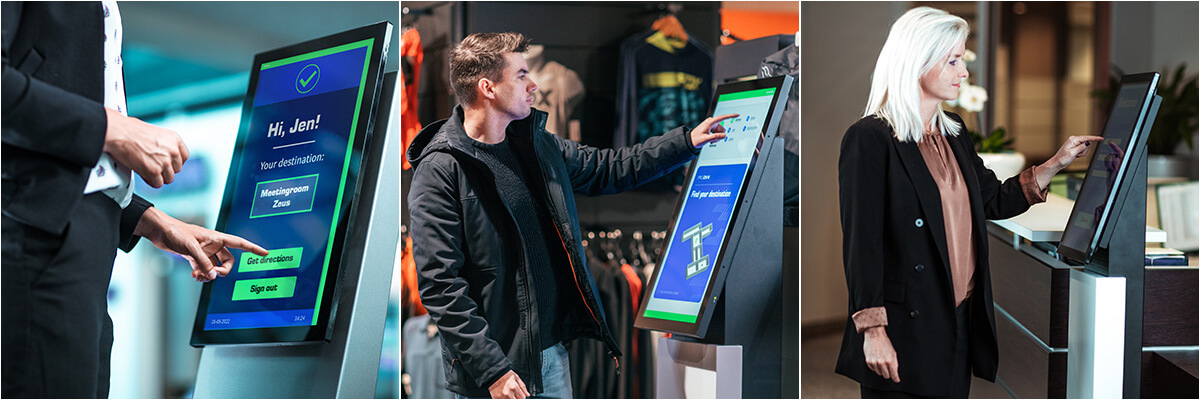Self-service kiosks are rapidly transforming how customers interact with a business. They offer a convenient and efficient way for customers to take control of their journey, enhancing customer experience which is essential for businesses in today's fast-paced world. But what exactly is a self-service kiosk, and how can it benefit your business?
This comprehensive guide dives deep into the world of self-service kiosks. Read and explore!
A self-service kiosk is a digital computer system equipped with a touchscreen interface that enables customers to complete tasks independently. It consists of various components, including a Panel PC or display/touchscreen monitor, add-on devices, housing (enclosure), and software. By combining these key components, businesses can design a customised self-service kiosk tailored to their individual requirements.
Common examples of self-service kiosks include self-scan check-outs in supermarkets, self-ordering kiosks in restaurants, digital receptions in offices, queuing systems at governmental institutions, or (visitor) registration kiosks at healthcare providers. The possibilities are endless!

Do you require assistance in configuring your self-service kiosk? Get in touch with one of our experts. We’re happy to help!
We live in an era of self-service. With 67% of customers actually preferring to use a self-service kiosk, companies can no longer afford to postpone offering a self-service kiosk solution for their customers. That’s why an increasing number of companies is implementing self-service kiosks. This implementation brings along numerous benefits, including:
Beyond a user-friendly interface, a successful self-service kiosk relies on robust hardware, with a Panel PC sitting at its heart. The Panel PC provides the central processing unit (CPU) and memory, enabling the kiosk to run software applications. Additionally, it facilitates seamless integration with add-on devices such as payment terminals, cameras, barcode scanners, and printers, transforming the kiosk into a multi-functional self-service solution.
Let our experts assist you in configuring your self-service kiosk. ProDVX has got you covered with a wide range of reliable Panel PCs and add-on devices, ensuring seamless performance for your self-service kiosk solution. Learn more about our self-service kiosk hardware here.
At first glance, the terms "digital kiosk" and "interactive kiosk" might seem interchangeable. However, there’s a key distinction between these two kiosks.
Digital kiosks, in essence, are displays that focus on one-way communication, presenting information in a digital format. This information can include static images, videos, or even basic scrolling text. They function similarly to digital signage but often serve a more specific purpose, such as displaying menus, wayfinding directions, or product information.
Interactive kiosks, on the other hand, take user engagement a step further, focusing on two-way communication. They incorporate touchscreen technology or other interactive elements, enabling users to actively engage with the displayed information. This can involve placing orders, completing transactions, or selecting options from a menu. Interactive kiosks provide a more dynamic and engaging user experience compared to their non-interactive counterparts.
In short, all interactive kiosks are digital kiosks, but not all digital kiosks are interactive.
Click to learn more about digital kiosks or take a deep dive into interactive kiosks.
Self-service kiosks come in many forms. That’s why it is important to identify your goals (e.g., faster checkout, improved wayfinding) to find the perfect fit for your business. To assist you in this process, we have highlighted six types of self-service kiosks, and their benefits, commonly used worldwide:
1. Payment kiosk: With a payment kiosk, also known as a self-order kiosk, customers can place orders and complete transactions quickly, securely, and independently, reducing wait times and cashier workload.
2. Check in kiosk: A check in kiosk, or digital reception, streamlines the check-in process for appointments, bookings, or events, improving efficiency and customer satisfaction while reducing wait times.
3. Visitor management kiosk: A visitor management kiosk allows visitors to self-register, enhancing security and efficiency while streamlining reception tasks.
4. Information kiosk: With an information kiosk, customers can easily access information about products and services, facilities, timetables, or promotional offers, improving customer service.
5. Wayfinding kiosk: Wayfinding kiosks help customers navigate your building or campus effortlessly, enhancing the visitor experience.
6. Queuing system: A visitor-centred queuing system brings order to chaotic queues, thereby reducing wait times and improving visitor experience.
The use of self-service kiosks extends far beyond a single industry. Self-service kiosks can be found in various settings, from retail stores, tourist attractions, and restaurants to airports, offices, and hospitals. Let's explore how various industries leverage these interactive solutions to enhance customer experience and streamline operations.
1. Retail kiosk: Retail kiosks empower customers to browse products, compare prices, view promotional offers, and check out independently, improving efficiency and reducing wait times.
2. Hotel kiosk: A hotel kiosk streamlines guest check-in and check-out processes, allowing staff to focus on personalised guest services. Additionally, a hotel kiosk can provide information about hotel facilities or guide guests through the building using interactive wayfinding, enhancing the guest experience.
3. Healthcare kiosk: Kiosks in healthcare simplify patient registration, appointment scheduling, wayfinding, and information access, enhancing patient convenience and reducing wait times.
4. Restaurant kiosk: With a restaurant kiosk, customers can browse menus, customise orders, and pay quickly, improving service speed and order accuracy.
5. Student Kiosk: A student kiosk provides students with real-time campus information, course schedules, and announcements, keeping them informed and engaged. Additionally, these kiosks can assist students in booking study rooms or finding specific books in the library, creating an efficient learning environment.
At ProDVX, we offer a wide range of high-quality, reliable Panel PCs and peripherals perfectly suited for self-service kiosk applications. Our hardware is designed for 24/7 use, ensuring a smooth and positive customer experience.
Working with industry-leading partners, we can provide you an all-in-one solution tailored to your specific needs. We'll assist you in selecting the right hardware, and connect you with a suitable partner to implement the preferred software.
Contact us
to discuss your self-service kiosk needs and explore how ProDVX can help you boost customer experience and operational efficiency.